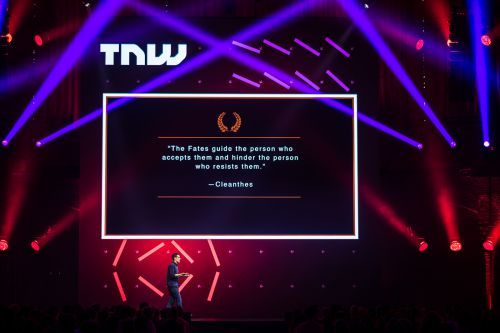The Canvas Strategy — What Ben Franklin and Bill Belichick Have in Common

Photo credit: ©Dan Taylor/Heisenberg Media.
“The person who clears the path ultimately controls its direction, just as the canvas shapes the painting.” – Ryan Holiday
My job is usually to deconstruct world-class performers from the best in the military, entertainment, politics, chess, and athletics, and tease out the routines and habits that you can use.
In this particular episode, I’m going to share an overarching strategy that has been used by many of the greats. That includes Ben Franklin, legendary NFL coach Bill Belichick, and many, many more. It is also how I built my network, how my first book hit the tipping point, how I became successful at angel investing, and the list goes on.
Of course, if you’re interested in the networking part of it, you can also read the blog post and listen to the episode, How to Build a World-Class Network in Record Time. But that is additional credit.
The secret is “canvas strategy.” And in this episode, Ryan Holiday, author of the new book, Ego Is the Enemy, will teach you how to apply canvas strategy to your life. (The book is also the newest addition to my book club, which can be found at audible.com/timsbooks.)
Please enjoy this excerpt with Ryan Holiday from Ego Is the Enemy.
Listen to it on iTunes.
Stream by clicking here.
Download as an MP3 by right-clicking here and choosing “save as.”
Want to hear another podcast with Ryan Holiday? — In this episode, we discuss the “big three” stoics, how Stoicism applies to the modern world, and how to improve your decision-making when stakes are high (stream below or right-click here to download):
This podcast is brought to you by Wealthfront. Wealthfront is a massively disruptive (in a good way) set-it-and-forget-it investing service led by technologists from places like Apple. It has exploded in popularity in the last two years and now has more than $2.5B under management. Why? Because you can get services previously limited to the ultra-wealthy and only pay pennies on the dollar for them, and it’s all through smarter software instead of retail locations and bloated sales teams.
Check out wealthfront.com/tim, take their risk assessment quiz, which only takes 2-5 minutes, and they’ll show you — for free — exactly the portfolio they’d put you in. If you want to just take their advice and do it yourself, you can. Well worth a few minutes to explore: wealthfront.com/tim.
This podcast is also brought to you by 99Designs, the world’s largest marketplace of graphic designers. I have used them for years to create some amazing designs. When your business needs a logo, website design, business card, or anything you can imagine, check out 99Designs.
I used them to rapid prototype the cover for The 4-Hour Body, and I’ve also had them help with display advertising and illustrations. If you want a more personalized approach, I recommend their 1-on-1 service. You get original designs from designers around the world. The best part? You provide your feedback, and then you end up with a product that you’re happy with or your money back. Click this link and get a free $99 upgrade. Give it a test run.
QUESTION OF THE DAY: What was your favorite quote or lesson from this episode? Please let me know in the comments.
Scroll below for links and show notes…
Selected Links from the Episode
Connect with Ryan Holiday: Website | Twitter
Ego Is the Enemy by Ryan Holiday (also on Audible)
The Obstacle Is the Way: The Timeless Art of Turning Trials into Triumph by Ryan Holiday
The Life Of Belisarius by Lord Mahon
Epigrams by Martial
Silence Dogood, the Busy-Body, and Early Writings by Benjamin Franklin
Show Notes
“Great men have almost always shown themselves as ready to obey as they afterwards proved able to command.” [06:53]
The definition (and pronunciation) of anteambulo. [07:04]
The problem with the patron-client system. [08:00]
The timeless indignity of the intern. [09:34]
Find canvases for other people to paint on (why being a path-clearing anteambulo for someone else also clears a path for you). [11:00]
Obeisance is the way forward. [11:52]
How Benjamin Franklin used the canvas strategy to learn how to be a better writer by anonymously penning the Dogood Letters. [12:32]
Franklin saw the benefit in making other people look good — even by letting them take credit for his work. [13:08]
Bill Belichick excels as a coach by embracing parts of the job other coaches usually hated. [13:25]
Bill Belichick’s father taught him how to use the canvas strategy to become a rising star without threatening or alienating anyone. [14:27]
Succumbing to the trappings of ego make using the canvas strategy impossible. [14:50]
Greatness comes from grunt work. [15:22]
The cumulative value of the canvas strategy. [15:41]
The cumulative effects of shunning obeisance. [16:37]
The person who clears the path — the lowly anteambulo — ultimately controls its direction, just as the canvas shapes the painting. [18:34]
People Mentioned
Benjamin Franklin
Bill Belichick
Ryan Holiday
Lord Mahon
Marcus Valerius Martialis (Martial)
Mela
Seneca the Younger
Petillius
Michelangelo
Leonardo da Vinci
Silence Dogood
James Franklin
Steve Belichick






